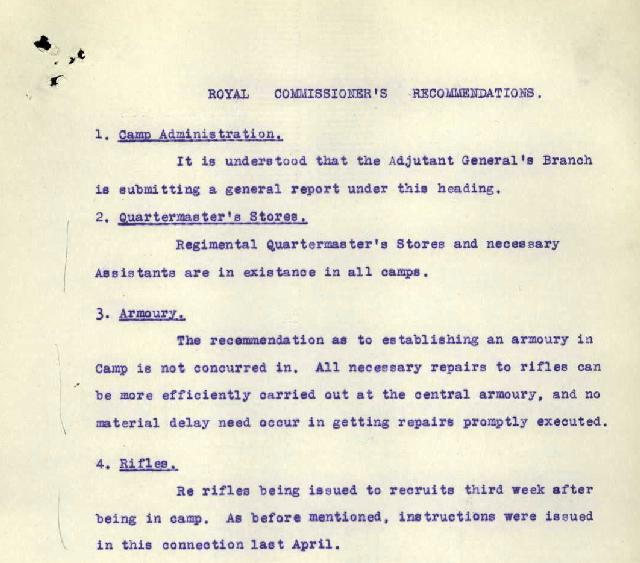Topic: BatzA - Liverpool
Australian Battles
The Battle of Central Station, New South Wales, 14 February 1916
Stanley Reply, 24 August 1915

The following response was written by Brigadier General John Stanley, Quartermaster General on the Military Board in response to the findings of Mr Justice Rich's Inquiry regarding the Liverpool Camp on 18 August 1915.
ROYAL COMMISSIONER'S RECOMMENDATIONS.
1. Camp Administration.It is understood that the Adjutant General's Branch is submitting a general report under this heading.
2. Quartermaster’s Stores.Regimental Quartermaster's Stores and necessary Assistants are in existence in all camps.
3. Armoury.The recommendation as to establishing an armoury in Camp is not concurred in. All necessary repairs to rifles can be more efficiently carried out at the central armoury, and no material delay need occur in getting repairs promptly executed.
4. RiflesRe rifles being issued to recruits third week after being in camp. As before mentioned, instructions were issued in this connection last April.
5. Public Houses.I am prepared to concur with the Commissioner in the proposal that public houses throughout the Commonwealth should be closed to soldiers for the sale of liquor if he will go the length of making the prohibition general and thus include all civilians; but I fail to see any good and satisfactory reason why a soldier should be debarred from his ordinary civil privileges and liberties, and branded as an irresponsible being. In my opinion no surer deterrent to recruiting than the adoption of this recommendation could be suggested.
6. Lighting of Huts.This is concurred in.
7. Kitchen Accommodation - Distribution of food. Mess Sheds and eating utensils -(a) Kitchens (e) Butchers' and cooks' implements (d) Means of cleansing utensils.Instructions have been issued to comply with above recommendations.
(b) Trained cooks and medical inspection.This is a part of the regular duty of those concerned.
(e)Light Covered Carts for delivering food are not necessary.
(f) Dining Sheds with concrete floors.Such accommodation has never been hitherto suggested in any camp of training and I do not personally consider that the circumstances warrant its being provided. It is, however, for the Minister to determine as to how far innovations of this order are to be introduced into camp life.
8. Hot Water Plunge Baths, etc.The Chief of Ordnance will doubtless submit his views as to the proposal for providing hot water plunge bathe for over 30,000 men - a huge contract.
9. Airing and Disinfecting Blankets and Drying ClothesInstructions have been issued accordingly.
10. HutsInstructions have been issued for supply of mattresses as an authorized issue, and for the proper cleansing and disinfecting of the huts, though such should not have been necessary.
11 LatrinesDirections concerning latrines and urine tubs have been given.12.(a) Plain Clothes Store; (b) Issues on arrival in Camp(a) Instructions were given in October last that a store should be provided at all camps, vide A.I.F. Orders para 64.
(b) If some of the recommendations advanced by the Commissioner are to be put into practice in their entirety, it is clear that service ideas must to some extent be set aside, and methods and devices entirely new to the soldier's mind adopted. For instance "Upon arrival they (the recruited should be provided with a hot meal and immediately after their rations and equipment should be given to them". Surely the Commissioner does not propose that the balance of each man's daily allowance of meat, bread, tea, coffee, sugar, pepper, salt, etc. is to be handed to him to store away as best he cam as is understood to be the custom on out-back stations. In any case it would be quite impossible to make general issues of food and rations to individuals.
(c) Embarkation of troops at too early an hourAs troops are compelled to march for a considerable distance through the main thoroughfares of the city en route for embarkation, it has been found necessary in order to avoid the large crowds which assemble to see them away, to make a start before the street traffic becomes dense, otherwise interference with discipline and serious delays occur.
(d) Stocks in Ordnance StoresWith reference to the suggestions that Head-quarters should take action to ensure that the District Ordnance Store is fully stocked a month or two in advance with the full requirements of all forces to be raised and equipped in each District, it would appear that the Commissioner had failed to appreciate the situation in this connection, it being well within the knowledge even of the general public, that the resources of the Commonwealth have been taxed to the uttermost in order to make even "hand to mouth" supplies at all times available for troops as they enlisted, and relays of clothing and equipment for those serving abroad. No amount of "courage or determination" (to use the Commissioner's words) could prevail to overcome difficulties arising from shortages of output from factories which have been, and are, working day and night and on Sundays to fulfil defence requirements.
(e)(f) and (g); Notices and lists in huts.The Finance Member will doubtless submit a report on this matter.(h)Instructions have been issued to carry out this recommendation.(i) Drafting Yard for RemountsThis is a matter for the Adjutant General.This matter will be investigated and a further report made.
Brigadier General John Stanley,
Quartermaster General
See: Stanley Letter, 24 August 1915
John STANLEY Military Biography
AIF Headquarters, 3rd Echelon, John STANLEY
War Diaries and Letters
All War Diaries and letters cited on this site should be read in conjunction with the Australian Light Horse Studies Centre, War Diaries and Letters, Site Transcription Policy which may be accessed at:
Australian Light Horse Studies Centre, War Diaries and Letters, Site Transcription Policy
Further Reading:
The Battle of Central Station, New South Wales, 14 February 1916
The Battle of Central Station, New South Wales, 14 February 1916, Roll of HonourBattles where Australians fought, 1899-1920
Citation: The Battle of Central Station, New South Wales, 14 February 1916, Stanley Reply, 24 August 1915



